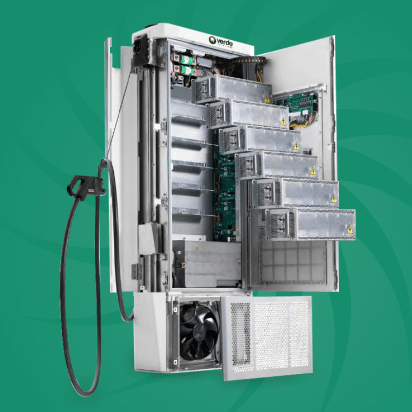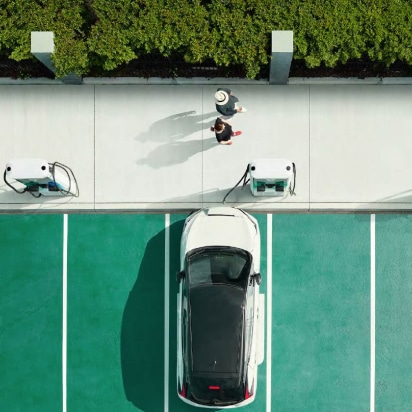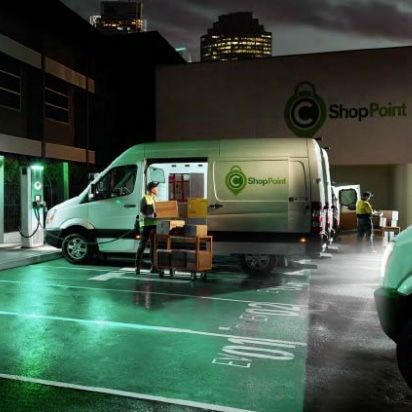By 2025, 25% of vehicles sales will be electric. Businesses have an opportunity to do their part to clean up the environment by making it easier for employees, visitors, and customers to charge their electric vehicles. In addition, EV charging provides additional revenue while showing your support for green initiatives.
Introducing the PKM150, Verde’s unique approach to modular and scalable directly current (DC) fast charging system.

creating a pool of shared power for the system’s chargers to access.

by leveraging the pool of shared power to deliver higher charger availability and power output, with minimal capital investment.

for world-class reliability and serviceability.
Verde Solutions will help you determine your EV charging needs. The compact and robust chargers are designed to look great on Main Street and thrive in hard conditions, through technology engineered to be easy to install, own, and use.

Electric vehicles are becoming increasingly popular, but many drivers are still unsure how long it takes to charge an EV. The answer, of course, depends on the size of the battery and the type of charger being used. A full charge on a smaller battery can be achieved in as little as two hours, while a larger battery may take eight hours or more. However, most drivers will only need to charge their EVs for a few hours each week. Newer EVs can often travel hundreds of miles on a single charge, making them a viable option for even long-distance journeys. With charging times falling and range increasing, it is no wonder that EVs are becoming very popular.
If you’re thinking about switching to an electric vehicle (EV), one of the first questions you probably have is about cost. How much does it cost to charge an EV, and will you be able to save money in the long run? The good news is that, in most cases, it costs less to charge an EV than it does to fuel a gasoline-powered car. Depending on the location and type of charger, it can cost as little as $0.03 per kWh to charge your EV. Compare that to the $0.12 per kWh average cost of gasoline, and you can see the potential for significant savings. Of course, the actual cost will vary depending on factors like your car’s battery size and the price of electricity in your area. But even if charging your EV costs a bit more than fueling a gas car, the environmental benefits of electric vehicles make them a worthy investment for the future.
The short answer to this question is “it depends.” Some EV charging stations are free to use, while others charge a fee. Ultimately, it depends on the owner of the charging station. Some businesses or organizations opt to make their EV charging stations free to use to attract customers or promote environmental sustainability. However, other companies may charge a fee for using their EV charging stations to offset the cost of installation and maintenance. There is no right or wrong answer when it comes to whether or not EV charging stations should be free. It ultimately depends on the goals of the organization or business involved.
The cost of a commercial electric vehicle (EV) charging station depends on various factors, including the type of charger, the number of chargers, the installation location, and the features included. Level 1 chargers are the least expensive, while Level 3 chargers are the most costly. The number of chargers also affects cost; a single charger will be cheaper than a multi-unit charger. Installation costs vary depending on the project’s complexity but generally range from $1,000 to $5,000 per charger. The price of a commercial EV charging station can also be affected by incentive programs offered by state and local governments. These programs can reduce the upfront cost of purchasing and installing a charger by up to 50%.
One of the most common misconceptions about electric vehicles is that all EVs use the same charger. In reality, EVs use three different chargers, each of which has unique benefits and drawbacks. The most common type of charger is the Level 1 charger, typically found in homes and office buildings. Level 1 chargers use standard 120-volt outlets and can charge an EV in approximately eight hours. Level 2 chargers are common and can be found at public charging stations and some private businesses. These chargers use 240-volt outlets and can charge an EV in about four hours. Finally, there are DC fast chargers, which use high-voltage 480-volt outlets and can charge an EV in as little as 30 minutes.
Most homeowners don’t need a permit to install an electric vehicle (EV) charger, but it’s always best to check with your local building department first. Sometimes, a permit may be required if you’re modifying your electrical system or if the charger will be installed in a public space. Even if a license isn’t required, you may still need to have your installation inspected by a certified electrician to ensure that it meets all safety standards. Overall, getting a permit for your EV charger is a simple process that will help ensure that your charger is installed correctly.